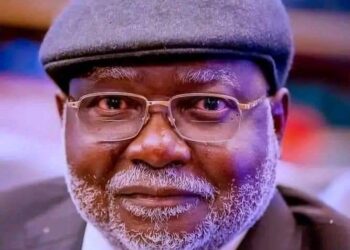Panelists at the recent National Summit on Justice 2024 held in Abuja have faulted the dual role of the Chief Justice of Nigeria, Justice Olukayode Ariwoola, as chairman of both the National Judicial Commission (NJC) and the Federal Judicial Service Commission (FJSC).
There were also resolutions to present to the National Assembly (NASS) for inclusion in the ongoing constitution review process.
Addressing the media on the outcome of the summit, Dr Babatunde Ajibade, (SAN) noted that the summit came out with some far-reaching measures on the nation’s justice reform.
“The consensus at the end of the Summit was that issues raised were topical and significant and there’s was a commitment by the Hon Attorney General and by all present that had listened to the discussions and deliberations at the summit, that there was a need to engage as quickly as possible in converting the discussions and resolutions into draft legislation that will be presented to the National Assembly for inclusion in the ongoing constitution review process, and also for non-constitutional related legislation to be implemented almost immediately,” Ajibade said.
Speaking at the Judicial panel session moderated by Mrs Funke Adekoya and the President of the National Industrial Court, Justice Benedict Kanyip, Dr. Oliver Stolpe of the UNODC; Professor Ameze Guobadia of the Faculty of Law, University of Lagos and Dr. Muiz Banire (SAN) as panelists, expressed concerns about the fact that the Chief Justice of Nigeria, who is the chairman of the NJC is also the chairman of the Federal Judicial Service Commission, which is the body that initially reviews proposals or lists of candidates by appointment into judicial office.
“The members pointed out the seeming inconsistency between the Chief Justice of Nigeria playing both roles, as it would appear that he is then recommending candidates to himself being chairman of both bodies, and being the person who appoints a significant number of the members of both bodies other than those who are statutory members.
“The general consensus reached by this panel was that the role of the NJC in discharging his responsibility for judicial appointments into the Superior Court of record required significant review,” the communiqué read.
According to the communiqué: “There was a general consensus that there was a need to reconstitute or proposed the reconstitution of these bodies, both the National Judicial Council and the Federal Judicial Service Commission.
“The second panel during the technical session of the summit also focused on the role of the State Judicial Service Commission, and also concluded that there was a significant need for reform in the performance of their roles.
” There were quite a lot of observations made by the two former Attorneys General who had participated as members or statutory members of the State Judicial Service Commissions in one form or the other about the composition of the state judicial Service Commissions.
“About the fact that the current NJC Guidelines may have subverted the intent of the constitutional provision, empowering the State Judicial Service Commissions to make judicial appointments, because the NJC guidelines, rather than authorising the State Judicial Service Commissions to prepare a shortlist of potential candidates for judicial appointments, appear to address that responsibility solely in the chairman.
“And the chairman of the State Judicial Service Commissions are the Chief Judges of the states. So, there was a pointed suggestion that in the short term, even before we get to constitutional amendments, regarding the composition of State Judicial Service Commissions, a low hanging fruit that could be dealt with immediately, is an amendment of that aspect of the NGC guidelines to make clear that the development or preparation of shortlist of candidates for judicial appointments is something that is to be done by the Commissions as a whole and not just by the Chief Judges.”




